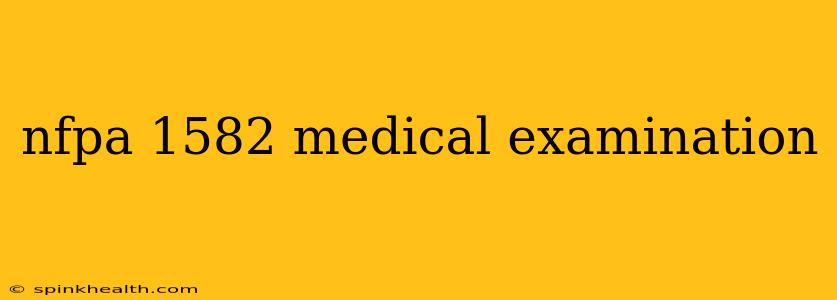The air crackled with anticipation as I geared up, the familiar weight of my turnout gear a comforting presence. Another day, another potential life-saving mission. But before I even stepped foot onto the firetruck, there was a crucial element to my readiness: the NFPA 1582 medical examination. This wasn't just a routine checkup; it was a vital safeguard, ensuring my physical and mental fitness for the demanding job of a firefighter.
This wasn't a story just about my experience, but a deeper dive into what this comprehensive medical examination entails and why it's so crucial for the safety and longevity of firefighters. NFPA 1582 isn't just a set of guidelines; it's a testament to the commitment to prioritizing the well-being of those who bravely face danger every day.
What is the NFPA 1582 Medical Examination?
The NFPA 1582 standard, "Standard on Comprehensive Occupational Medical Program for Fire Fighters," outlines the requirements for a thorough medical evaluation specifically designed for firefighters. It's not your typical annual physical. This exam goes far beyond the basics, delving deep into the unique physical and mental stresses firefighters endure. The goal? To identify potential health problems early on, prevent future injuries, and ensure firefighters are physically and mentally capable of performing their duties safely and effectively. Think of it as a proactive approach to safeguarding the health of our brave heroes.
What Tests are Included in the NFPA 1582?
The NFPA 1582 medical examination is a comprehensive process that covers several areas:
1. Physical Examination: This isn't just a quick listen to your heart and lungs. We're talking a detailed head-to-toe assessment, checking everything from your vision and hearing to your musculoskeletal system, cardiovascular health, and more. It's about identifying any pre-existing conditions or potential vulnerabilities that could be exacerbated by the job's demands.
2. Cardiovascular Screening: This is a critical component, given the strenuous physical activity involved in firefighting. It typically includes an electrocardiogram (ECG) to assess heart function, and sometimes even a stress test to evaluate how well your heart performs under pressure (literally!).
3. Pulmonary Function Tests: Firefighters breathe in a lot of smoke and other hazardous materials. This part of the examination checks for respiratory issues and identifies any signs of lung damage, often through spirometry. Early detection is crucial for managing and potentially mitigating long-term effects.
4. Audiometric Testing: The constant exposure to loud noises can severely damage hearing over time. Regular audiograms ensure any hearing loss is detected early, helping firefighters protect their hearing through preventative measures.
5. Vision Testing: Clear vision is absolutely paramount in emergency situations. This is more than just checking your ability to see; it also often includes a color vision test.
6. Psychological Evaluation: The job takes a toll, not just physically. NFPA 1582 acknowledges the mental health challenges firefighters face and includes provisions for psychological screenings, recognizing the importance of early intervention for stress, PTSD, and other mental health issues.
How Often Do Firefighters Need an NFPA 1582 Medical Exam?
The frequency of the examination depends on factors such as age, medical history, and job duties. Generally, most firefighters undergo the full comprehensive exam every year or two, while some may be examined more frequently depending on individual circumstances and risk factors. It's a vital part of their annual health assessment, designed to support their long-term well-being.
What Happens if a Firefighter Fails the NFPA 1582 Exam?
Failing the exam doesn't automatically mean the end of a firefighting career. It often signals a need for further investigation and potentially, treatment or lifestyle changes. The process is collaborative, with doctors working with firefighters to address any identified issues and develop a plan to ensure their health and safety. It's about finding ways to safely return to active duty, or to pursue other suitable roles within the department.
What are the Benefits of the NFPA 1582 Medical Exam?
The benefits are multifold:
- Early detection of health problems: Identifying potential issues before they escalate prevents serious health problems.
- Improved firefighter safety: By ensuring only physically and mentally fit individuals are on the job, it improves overall safety for the firefighter and their team.
- Increased longevity and career sustainability: Early interventions and preventative measures extend the firefighting career while minimizing long-term health risks.
- Reduced healthcare costs: Early intervention is more cost-effective in the long run than treating serious, late-stage health problems.
- Enhanced peace of mind: Knowing that their health is being actively monitored provides both firefighters and their families with added peace of mind.
The NFPA 1582 medical examination isn't just a medical requirement; it's a cornerstone of a firefighter's overall well-being and a symbol of the commitment to their health and safety. It's an investment in the future, ensuring that these brave individuals can continue serving their communities for years to come. It's more than a medical exam; it's a commitment to the health of those who protect us.

